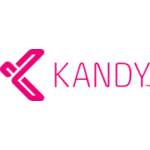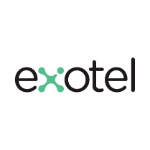TechnologyCounter provides genuine, unbiased real user reviews to help buyers make informed decisions. We may earn a referral fee when you purchase through our links, at no extra cost to you.
List of 15 Best Cloud Communication Platform Software
Showing 1 - 15 of 51 productsServetel is an innovative cloud communication platform that specializes in providing top-notch solutions for businesses of all sizes. With its user-friendly interface features, Servetel enables companies to streamline their communication processes an...Read Servetel Reviews
CometChat, a powerful and innovative communication software designed to enhance real-time interactions between individuals and businesses. With user-friendly features and a seamless integration process, CometChat is revolutionizing the way we connect...Read CometChat Reviews
KANDY is more than just a software - its a solution. This all-in-one communications platform allows businesses to seamlessly connect with customers through various channels including voice, video, and messaging. With KANDY, the possibilities for effe...Read KANDY Reviews
Fuze is a communication platform that connects global teams effortlessly. With top-notch features like HD video conferencing, screen sharing, and real-time messaging, Fuze takes remote collaboration to the next level. Say goodbye to mundane conferenc...Read Fuze Reviews
Twilio - your all-in-one communication platform. With Twilio, easily integrate messaging, voice, and video capabilities into your applications and websites. Simplify your communication strategy and reach your customers in a more personal is a way. Jo...Read Twilio Reviews
Cisco WebEx is a video conferencing platform that facilitates seamless communication and collaboration for businesses of all sizes. With an easy-to-use interface and robust features, WebEx allows teams to connect, share ideas, and collaborate in real...Read Cisco WebEx Reviews
CloudTalk is a Call Center Software specially created for the use of agencies and small to medium-sized enterprises. It is an online solution that provides features such as Queue Management, Call Recording, Contact Management, and VoIP all in one co...Read CloudTalk Reviews
8x8 Virtual Office, a powerful communication and collaboration tool designed for modern businesses. With its advanced features and user-friendly interface, 8x8 Virtual Office takes remote working and team collaboration to the next level. Streamline y...Read 8x8 Virtual Office Reviews
Zoho Cliq is a business communication software that simplifies and streamlines your teams interactions with organized conversations, audio/video meetings, and easily accessible information. Designed for a hybrid work environment, Cliq allows you to l...Read Zoho Cliq Reviews
Knowlarity is a leading technology company that has revolutionized the way businesses communicate with their customers. With a mission to simplify and streamline communication, Knowlarity offers a range of solutions for businesses, including cloud-ba...Read Knowlarity Reviews
Exotel is a leading cloud-based communication platform that connects businesses with their customers through reliable and scalable solutions. With a focus on simplifying communication processes and enhancing customer engagement, Exotel empowers busin...Read Exotel Reviews
Avaya is a leading provider of innovative communications software designed to empower businesses of all sizes. With a strong commitment to customer satisfaction, Avaya offers a wide range of solutions that enhance collaboration, increase efficiency,...Read Avaya Reviews
Whispir is a and versatile communication platform that helps businesses of all sizes connect, engage, and automate their communications. With its intuitive interface and robust features, Whispir provides a seamless is a way to reach customers, stakeh...Read Whispir Reviews
MiCloud Connect is a communication and collaboration platform designed to bring teams together no matter where they are located. With its seamless integration of voice, video, and messaging, MiCloud Connect allows for efficient and effective communic...Read MiCloud Connect Reviews
Ozonetel CloudAgent, is a solution for all your call center needs. With advanced features and seamless integration, CloudAgent streamlines your customer interactions and boosts your teams productivity. Say goodbye to manual processes and hello to a m...Read Ozonetel CloudAgent Reviews
- What Is Cloud Communication Platform Software?
- Top Reasons Why Businesses Need Cloud Communication Platform Software?
- What Are the Top Key Features of Cloud Communication Platform Software?
- What Are the Top Benefits of Cloud Communication Platform Software?
- What Are the Steps to Choose the Right Cloud Communication Platform Software?
- What Are the Types of Cloud Communication Platform Software for Different Industries?
- What Are the Technology Trends for Best Cloud Communication Platform Software?
- What Are the Deployment Options for Cloud Communication Platform Software?
What Is Cloud Communication Platform Software?
Cloud Communication Platform Software refers to a comprehensive suite of technologies specifically developed to enable enterprises to establish, oversee, and expand their communication channels via the internet. This platform facilitates the utilization of internet-based communication methods such as online phone conversations, electronic messaging, and other forms of real-time interactions for enterprises.
These cloud communication platform companies find application across diverse industries, including but not limited to customer service, marketing, sales, finance, healthcare, and education. The cloud communication platform provides a diverse array of services that facilitate the optimization and personalization of communication processes within enterprises.
The range of services provided encompasses VoIP, video-conferencing, audio-conferencing, voicemail, interactive voice response (IVR), text messaging, webchat, and various other services. Cloud communication platform software has the capability to facilitate the establishment of marketing campaigns, the management of customer interactions, the automation of communications, and the monitoring of consumer involvement.
These cloud communication platform companies facilitate the optimization of operational efficiency and cost reduction for enterprises through the utilization of cloud-based technologies to augment customer service. Cloud communication software is designed to operate on either public or private cloud networks, facilitating safe connectivity between organizations and their customers, employees, and partners across various devices and geographical locations.
Organizations can efficiently and expeditiously implement communication solutions without the need for substantial investments in costly hardware or software, thanks to the utilization of best cloud communication platform software.
Top Reasons Why Businesses Need Cloud Communication Platform Software?
1) Improve customer experience- Cloud communication platform software facilitates the enhancement of customer experience through the provision of prompt, dependable, and tailored customer care across various communication channels.
2) Scalability - Businesses have the capacity to rapidly and effortlessly increase their consumer base through the ability to scale up or down as needed.
3) Flexibility - Businesses has the capacity to readily adapt their communication platforms in accordance with evolving client needs and preferences.
4) Connectivity - The utilization of best cloud communication platform software facilitates global connectivity between organizations and customers across various devices and communication channels.
5) Cost efficiency - Businesses have the potential to achieve substantial cost savings on their IT infrastructure by adopting best cloud communication platform software.
6) Unified experience - Customers are able to achieve a cohesive and uninterrupted experience while engaging with a business over various communication channels, devices, and technology.
7) Automation - Businesses have the capability to automate processes that are time-consuming and monotonous, so allowing people to allocate their time and efforts towards activities that contribute value.
8) Security - The utilization of best cloud communication platform software offers improved data security compared to conventional on-premise systems.
9) Disaster recovery - Businesses may ensure the security and backup of their systems at all times, thereby facilitating swift and effortless recovery from unforeseen disasters.
10) Advanced analytics - Businesses have the ability to measure customer engagement and acquire more profound understanding of customer behavior by utilizing robust analytics capabilities.
11) Integrations - Cloud communication platform software enables businesses to seamlessly interact with various cloud-based software applications, such as customer relationship management (CRM) systems and marketing automation platforms.
12) Advanced features - Organizations have the ability to employ application programming interfaces (APIs) in order to personalize their communication platforms, thereby harnessing the benefits of speech recognition and artificial intelligence functionalities.
13) Multi-language support - Organizations have the ability to customize their communication platforms in order to facilitate the utilization of different languages and localization, hence enhancing their worldwide outreach.
14) Team collaboration - The utilization of cloud communication platform software facilitates effective team cooperation and communication, hence enhancing the productivity of personnel.
15) Connected customer journeys - Businesses have the ability to establish interconnected customer journeys across several channels that are customized to cater to diverse consumer segments.
What Are the Top Key Features of Cloud Communication Platform Software?
1. Automatic Call Routing: The utilization of cloud communication platform software enables the implementation of personalized automated call routing, hence facilitating the accurate redirection of calls to the appropriate extension. This feature plays a crucial role in ensuring the prompt resolution of customer service inquiries.
2. Call Recording: The act of recording the entirety of customer care calls can serve as a means to guarantee the appropriate handling of client complaints and inquiries, as well as the proper storage and management of customer data.
3. Caller ID: The cloud communication platform software offers caller identification services to facilitate the identification of clients when they make phone calls.
4. Automated Voice Messaging: Automated voice messaging holds significant importance as a key component inside cloud based communication platform. The utilization of automated voice messages enables the prompt and direct dissemination of information to customers.
5. Call Analytics: Call analytics play a crucial role in enabling organizations to assess the efficacy of their customer service operations. Cloud communication platform software offers a range of reporting and analytics capabilities that enable the measurement of various metrics, including customer satisfaction, call abandonment rates, call duration, and other relevant indicators.
6. Advanced Security: Cloud communication platform software offers robust security features, including encryption and identity verification, which serve to safeguard client data and enhance its protection.
7. Unified Communications: Cloud communication platform software has the capability to facilitate unified communications, enabling businesses to seamlessly incorporate audio, video, and chat services inside a consolidated platform.
8. International Support: Cloud communication platform software offers comprehensive international support to facilitate organizations in effectively connecting with clients across various regions.
9. Scalability: Cloud communication platform software exhibits a high degree of scalability and possesses the ability to readily accommodate evolving business requirements.
10. Integration: The integration of best cloud communication platform software with various corporate applications, including customer relationship management (CRM) systems and marketing automation tools, can effectively enhance productivity and foster higher levels of customer satisfaction.
What Are the Top Benefits of Cloud Communication Platform Software?
1. Cost Effectiveness: Cloud communication platform software solutions have the potential to significantly decrease expenses in comparison to conventional phone systems and services. The rationale behind the adoption of cloud-based solutions is in their ability to obviate the necessity of hardware acquisition, while concurrently yielding financial benefits through reduced expenses on long distance and international communication.
2. Scalability: Cloud communication platforms offer businesses the advantage of scalability, eliminating concerns over the acquisition of additional phones and gear in the future. Furthermore, it possesses the capability to be rapidly enhanced in order to accommodate escalating requirements.
3. Automated features: Best cloud communication platforms typically have many automated functionalities, including but not limited to auto attendant, voicemail to email, call routing, and caller identification. This facilitates the optimization of corporate processes and enhances the overall client experience.
4. Flexibility: Cloud communication platforms offer the convenience of universal accessibility, allowing users to connect seamlessly across various devices and geographical locations. This capability facilitates enhanced connectivity and communication between physical offices, satellite offices, and remote employees.
5. Productivity Gains: The implementation of automated functions, such as the conversion of voicemail messages into email format and the routing of calls to the relevant staff, facilitates the expeditious and accurate distribution of communication inside enterprises. Consequently, these technological advancements enable firms to enhance their operational efficiency and effectiveness.
6. Enhanced Security: Cloud communication platforms are typically characterized by enhanced security measures, as they are hosted externally by a third-party service provider. This feature serves the purpose of guaranteeing the safety and security of your data, even in the event of a power outage or any other form of disturbance.
7. Easy Maintenance: Cloud based communication platform are overseen and upheld by the vendor, hence obviating the necessity for enterprises to do any technical modifications or enhancements. This enhances the usability and maintainability of the system.
What Are the Steps to Choose the Right Cloud Communication Platform Software?
1. Define your organization's communications needs: Prior to the selection of a cloud communications platform software, it is crucial to evaluate the communication requirements of one's firm. It is vital to deliberate over the many categories of communication tools that are required and the intended manner in which they are to be utilized.
2. Identify features and functionality: After the identification of organizational communication needs, the subsequent step involves the identification of essential features required in a cloud communication platform software. Consider the essential aspects that hold significance for your team, as well as those that can be deemed dispensable.
3. Evaluate software options: After determining the necessary features and capabilities, the next step involves the assessment of available software solutions for cloud communication platforms. Conduct a thorough search for software solutions that align with your specific requirements and proceed to evaluate and contrast the pricing structures offered by various vendors.
4. Consider cost and scalability: When evaluating various cloud communication platform software alternatives, it is important to take into account both the comprehensive cost of the product and its scalability. One should contemplate the manner in which the program will effectively manage the increasing demands of communication.
5. Try before you buy: After reducing the number of options on your list, it is advisable to test the software by utilizing a trial or sample version. This will provide a comprehensive understanding of the software's functionality and its potential for optimal utilization by your team.
6. Make the right decision: Upon doing a comprehensive evaluation of various cloud based communication platform possibilities, it is imperative to make a judicious selection regarding the most suitable choice for meeting the specific requirements of your firm. When making a decision, it is important to take into account many factors such as cost, scalability, features, and usefulness.
What Are the Types of Cloud Communication Platform Software for Different Industries?
The variability of cloud communication platform software is contingent upon the specific industry it is designed to serve. There are various prevalent categories of best cloud communication platform software, which encompass:
1. Business Voice Over IP (VoIP): The field of business encompasses various aspects of commerce, including the production, distribution, and consumption Voice over Internet Protocol (VoIP) software offers a range of sophisticated and dependable communication functionalities suitable for enterprises, small businesses, and remote team collaboration across various scales. Voice over Internet Protocol (VoIP) software commonly encompasses a range of functionalities, including but not limited to voice and video communication, instant messaging, conference calling, and call recording.
2. Collaboration Suite Software: cooperation suite software is specifically engineered to enhance and streamline team cooperation in diverse geographical locations and across various time zones. Common components of this software often encompass functionalities such as the facilitation of file sharing, utilization of project management tools, provision of a document library, support for video conferencing, organization of online meetings, and implementation of instant messaging capabilities.
3. Customer Relationship Management (CRM): CRM cloud software is purposefully developed to assist users in effectively managing and monitoring client data, interactions, and sales performance. Customer Relationship Management (CRM) software commonly encompasses a range of functionalities, including but not limited to lead tracking, customer segmentation, help desk automation, and customer data analytics.
4. Cloud Storage: Cloud storage software enables individuals to save files and data on a distant server as opposed to their personal devices. Commonly found characteristics of this service encompass an expansive storage capacity, a secure means of transferring data, the ability to share files, and the provision of data backup capabilities.
5. Automation: Automation software is utilized by businesses to streamline and expedite labor-intensive tasks, hence enhancing overall productivity and operational efficiency. This category of software generally encompasses functionalities such as task scheduling, workflow automation, and rules engine.
6. Video Conferencing: Video conferencing software enables organizations to organize virtual meetings, thereby facilitating communication and collaboration among remote employees and external stakeholders. Commonly found functionalities encompass elements such as high-resolution video, the ability to share screens, and the provision of virtual chat spaces.
What Are the Technology Trends for Best Cloud Communication Platform Software?
The technology trends in cloud communication platform software are constantly evolving, but certain trends remain consistent and popular.
1. Mobile access – Numerous software solutions for cloud communication platforms have been specifically engineered to ensure compatibility with mobile phones and tablets, thereby enabling users to conveniently access and oversee their communication platforms from any internet-connected device.
2. Integrated communication – Cloud communication platforms are specifically engineered to establish connections between various communication channels, encompassing voice, emails, SMS, and social media, thereby consolidating them into a singular integrated platform.
3. Multi-user access – Cloud communication platform software solutions are specifically developed to accommodate multiple users, prioritizing accessibility and collaboration. This feature facilitates the ability of individuals and teams to conveniently oversee and control their communication activities inside a unified platform.
4. Security and privacy – Cloud based communication platform solutions frequently employ sophisticated technology to guarantee the confidentiality and security of conversations.
5. Compliance – Cloud communication platform software solutions are frequently developed with the intention of adhering to a range of industry standards and laws.
6. Cost-efficiency – The advent of cloud computing has led to the development of numerous software solutions for cloud communication platforms, which aim to provide cost-effective communication services for organizations by utilizing cloud hosting.
7. Automation – The utilization of best cloud communication platform software solutions is witnessing a growing trend towards automation. This facilitates the rapid and secure execution of automatic answers, text message reminders, and other automated processes.
What Are the Deployment Options for Cloud Communication Platform Software?
The deployment choices for Cloud Communication Platform program (CCP) are contingent upon the unique characteristics of the program in question. In the realm of information technology, it is widely recognized that there exist three primary deployment methods.
1. Public cloud: The CCP software is typically deployed on a public cloud infrastructure, such as Amazon Web Services or Microsoft Azure. This paradigm offers advantages such as accelerated time to market, scalability, and efficient deployment. The key benefits of this technology include its cost-effectiveness and its ability to provide access to a diverse array of functions.
2. Private cloud: The model in question exhibits a distinction from the public cloud model in that the Customer Control Plane (CCP) software is situated within the customer's private infrastructure or within the private data center of the cloud service provider. This particular deployment methodology provides enhanced control, tailored feature sets, increased scalability, and heightened security measures.
3. Hybrid cloud: This amalgamation incorporates elements from the preceding two models. Organizations can effectively utilize their current private cloud infrastructure while simultaneously capitalizing on the scalability, cost-efficiency, and extensive features offered by the public cloud. Organizations may choose to integrate their current apps with a cloud communication platform as a means of enhancing integration.















